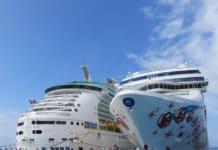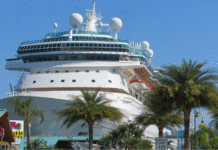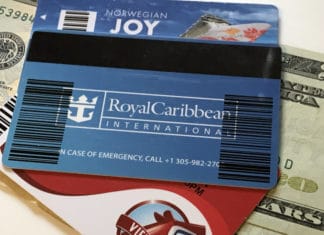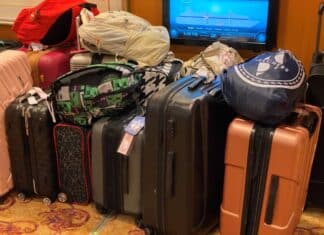In a move that could have a drastic impact on the cruise industry, Reuters reports that the Trump administration is looking at possible ways to limit cruise travel as a means of fighting against the coronavirus.
The United States is considering ways to discourage U.S. travelers from taking cruises as part of a broader Trump administration effort to limit the spread of coronavirus, according to four officials familiar with the situation.
The officials, who asked to remain anonymous, said no decision had been made. The discussions were taking place ahead of a meeting this weekend between Vice President Mike Pence, who is in charge of leading the U.S. response to the coronavirus, and the cruise industry.
The administration could advise some or all U.S. travelers to temporarily avoid taking cruises in the face of a growing number of coronavirus cases on cruise ships or potentially impose travel restrictions related to cruises, officials said.
Cruises have been at the forefront of the headlines regarding the coronavirus. The Diamond Princess, which was quarantined and had the virus spread, made global news. Since then, several ships have been denied porting due to fears of infected passengers.
Most recently, this week a passenger who recently sailed aboard a Princess cruise ship from San Francisco passed away due to the virus. Officials worry that he was exposed while on the ship.
Apart from the Diamond Princess, the number of confirmed coronavirus cases with ties to cruise ships appears low, but they are not zero. Even so, there’s little arguing that the close proximity of thousands of passengers on a cruise can lead to quick spread of viruses.
Whether discouraging or restricting cruises would help stop the coronavirus or not, it could have an enormous impact on the industry, which is already reeling from the fallout.
In response to the Reuters article, Cruise Lines International Association (CLIA), an industry organization that represents all major cruise lines including Carnival, Royal Caribbean and Norwegian, released the following statement:
“Any action to restrict cruising is unwarranted, and at odds with the World Health Organization which ‘continues to advise against the application of travel or trade restrictions to countries experiencing COVID-19 outbreaks.’ Singling out the travel and tourism industry, and cruise lines specifically, will have significant detrimental impacts—some possibly irreversible—on the national and local economies.
“The cruise industry is a vital artery for the U.S. economy, supporting over 421,000 American jobs and contributing nearly $53 billion to the U.S. economy in 2018. Cruise activity supports travel agencies, airlines, hotels and a broad supply chain of industries that stretches across the United States.
“With the proactive measures in place by the cruise industry based on prevailing guidance from global health authorities, restricting cruising is unreasonable and will have long-lasting detrimental effects on the U.S. economy well beyond the travel and tourism industry.”
It’s important to note that as of yet, there has been no decision made. As well, this article names only four anonymous officials, so it’s not entirely clear how serious the proposal to restrict cruises actually may be.
That said, with the cancellations and disruptions on everything from flights to music festivals, seeing some sort of action on cruises doesn’t seem out of the question.
Cruise Lines Ease Cancellation Policies and Implement Tough Rules on Boarding

While cruise lines have seen the brunt of the impact from the virus, they haven’t stood still. Already the industry has implemented tough rules about who can board a ship.
Passengers who have recently been to coronavirus hotspots like China, South Korea, and Italy are denied boarding. As well, those in contact within the last 14 days with someone that is suspected to have the virus are denied access to the ship. There is also enhanced screening for illnesses, and increased sanitation onboard.
While the industry as a whole limits who can board right now, many cruise lines have implemented even tougher rules than the standards.
For instance, the industry calls for a ban on boarding from anyone who has been to the impacted regions in the last 14 days. Virgin Voyages has enacted a 21-day requirement instead. Royal Caribbean has a 15-day rule, but also includes enhanced screening for those who have been to places like Japan and Thailand.
That said, the virus continues to spread throughout the world, despite the efforts of officials worldwide. Dozens of countries are now impacted with cases.
In response, many cruise lines now offer new passenger-friendly cancellation rules that allow for passengers to have greater flexibility in cancelling if they are worried about the illness.
Just yesterday both Royal Caribbean and Norwegian announced plans that give passengers the opportunity to cancel their cruise up to 48 hours in advance without penalty. Those who do so will receive their cruise fare as a credit to use on a future cruise. Other lines have implemented similar procedures.
These changes are just one more example of how serious the virus has hit the cruise industry — and how they are making efforts to respond.












